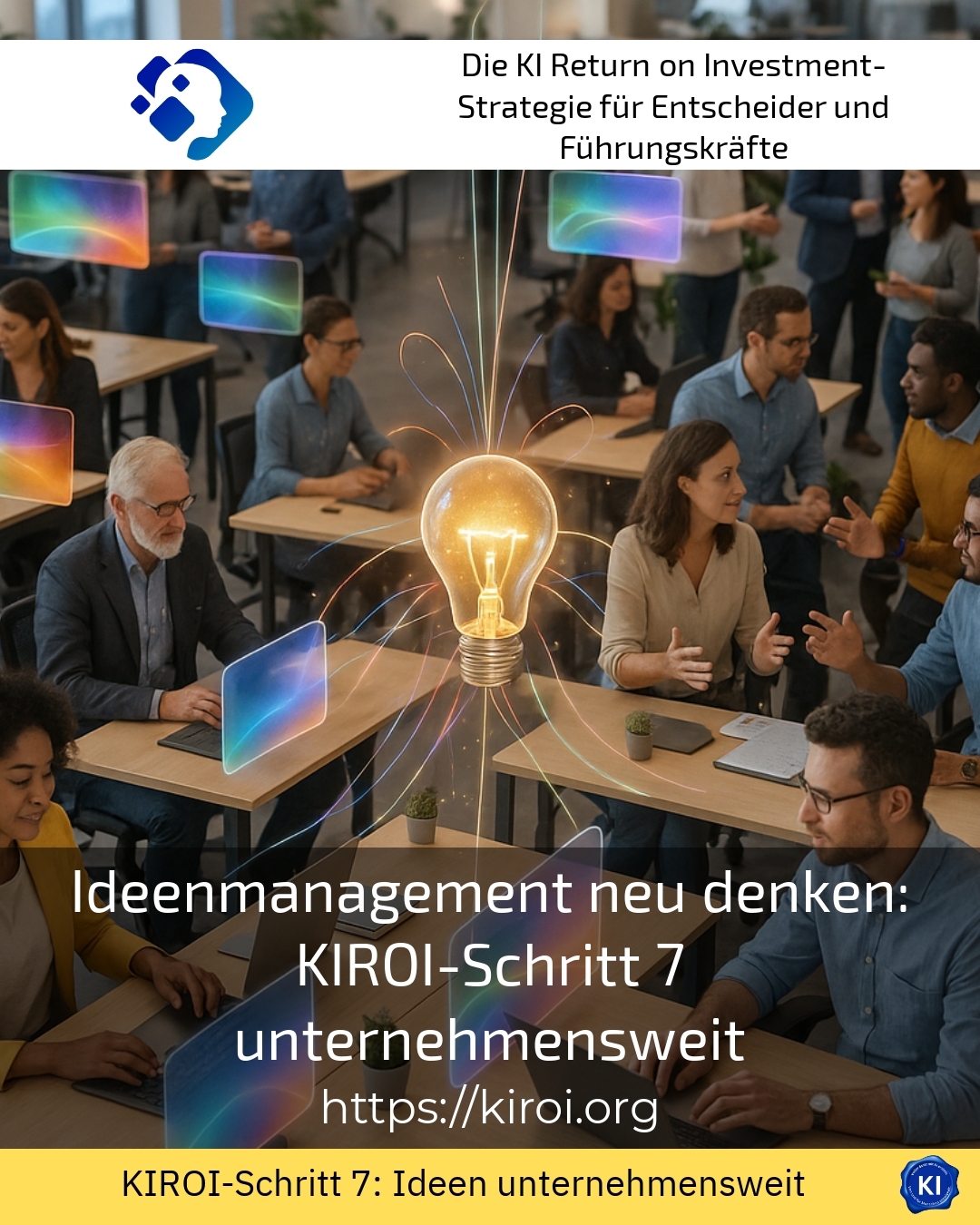In the context of modern corporate development, the Idea management is becoming increasingly important. It not only offers the opportunity to obtain individual suggestions, but also supports companies in systematically collecting and evaluating creative impulses and ultimately transforming them into sustainable changes throughout the organisation. This is where KIROI step 7 in particular comes in, in order to Idea management as a dynamic change process that actively involves all employees and strengthens the culture of innovation.
Unleashing the company-wide potential of idea management
Many organisations are familiar with the challenge of having excellent ideas but often struggling to implement them. KIROI Step 7 therefore provides a methodological framework that closes this gap. The focus is not only on collecting ideas, but also on accompanying them continuously - from their inception to their successful realisation. This company-wide perspective makes it possible to break down barriers and promote a culture of open communication.
For example, a manufacturing company improved the transfer of knowledge between production, quality assurance and logistics by organising structured workshops as part of KIROI Step 7. The increased cross-departmental communication led to accelerated innovation projects and a sustainable strengthening of the innovation culture. Another example from the software development sector showed how regular feedback rounds helped to prioritise project ideas more quickly and identify technical hurdles at an early stage.
In retail, the integration of digital tools promotes transparency in the ideas process. Ideas are not only documented there, but also assigned clear responsibilities and milestones, which significantly speeds up implementation.
Practical impulses for modern idea management
To implement KIROI step 7 effectively, it is advisable to focus on the following measures:
- Establish regular, moderated exchange formats that bring together employees from different departments. This promotes cross-departmental understanding and creativity.
- Implement digital platforms that enable transparent documentation of ideas and their status. This increases the traceability and motivation of idea providers.
- Define clear responsibilities and set milestones. This enables structured control of the implementation process.
In a mechanical engineering company, this combination of workshops and digital support led to new product innovations being realised in a significantly shorter time. At the same time, the working atmosphere improved because employees realised that their ideas were being taken seriously and actively supported.
A best-practice example from the service industry shows how ideas management became a fixed process in day-to-day business through continuous feedback loops and steering committees. As a result, the number of suggestions submitted increased and many measures were quickly piloted and adapted.
BEST PRACTICE with one customer (name hidden due to NDA contract)
In a technical services company, KIROI Step 7 supported the introduction of a scalable ideas process. Workshops were held in which various departments jointly analysed obstacles and developed new ideas for process optimisation. This coordinated approach significantly increased the speed of implementation, which was ultimately reflected in measurable efficiency gains.
AI and digital tools as powerful companions
The interplay between modern technology and human creativity is a key factor in the contemporary Idea management indispensable. Digital platforms not only facilitate documentation, but also offer analyses, prioritisation and communication at the touch of a button. AI-supported systems in particular help to recognise implementation hurdles at an early stage and evaluate the effectiveness of proposals.
In the logistics sector, for example, one company used AI tools to cluster ideas according to relevance and feasibility. As a result, important innovation projects were pursued in a more focused manner and the teams involved remained synchronised at all times.
Such digital tools provide an additional boost by keeping the idea management process transparent and clearly defining responsibilities at the same time. This keeps the creative potential of all employees alive and well channelled in the long term.
Ideas management as a driver for company-wide change
To summarise, it can be said that Idea management today is far more than just a place for proposals. It is a strategically important, dynamic process that helps companies to remain flexible and innovative. KIROI Step 7 facilitates this change through company-wide support, transparent structures and the active involvement of all employees.
It is particularly important that companies not only react to collected suggestions, but also establish a culture in which innovation is practised on a daily basis. The numerous examples from production, IT and retail show that this approach has many effects at the same time: faster implementation, more motivated teams and sustainable increases in efficiency.
My analysis
The Idea management is a key success factor for companies in all sectors today. KIROI Step 7 offers a practice-orientated framework for not only collecting creative potential, but also consistently supporting it and anchoring it throughout the company. The combination of moderated communication, digital support and clear responsibilities promotes a lively and sustainable culture of innovation. This allows projects to be realised more quickly and thus secure competitive advantages. Companies that consistently pursue this holistic change process can significantly increase their innovative strength and motivate their employees in the long term.
Further links from the text above:
KIROI step 7: Rethink idea management across the organisation
Rethinking idea management: KIROI step 7 for innovation
Implement KIROI step 7 company-wide
For more information and if you have any questions, please contact Contact us or read more blog posts on the topic Artificial intelligence here.















